Egypt

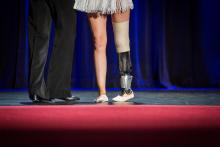
Among the many images of the marathon victims that emerged shortly after the attack, I remember being most struck by the photographs of the injured victims, missing their once sturdy limbs, lying in hospital beds. For me, those images perfectly conveyed how our city was feeling at that moment. We had just had something ripped away from us. We were assaulted, grieving for our loss, and outraged that any human being could dare do this to us.
How would our injured victims respond? Within days, the answer was clear. They would remain resilient. Adrianne Haslet-Davis would dance again, now with a prosthetic limb. Never a runner before, Celeste Corcoran pledged to run a marathon, now on her two prosthetic limbs. And, shaken by the tragedy, Amanda North would quit her job and launch the dream of her own artisan business.

There’s a lot anyone can learn from Jehane Noujaim’s Oscar-nominated documentary The Square, an examination of the 18-day uprising that toppled President Hosni Mubarak.
But Egyptians may be least able to benefit from its lessons. So far, the film has not been approved for screening here.
On the third anniversary of Mubarak’s ouster, which falls on Tuesday, Egypt is more polarized than ever, largely between those who are sympathetic to the Muslim Brotherhood and those who support the military. The film is a reminder of what Egyptians share, regardless of religious or political beliefs.
With just a few days to go before Christmas, many Americans will be rushing around completing their Christmas preparations: doing their last minute shopping, finalizing travel plans, figuring out how to deal with awkward family dynamics. In many cases, they will be faced with what is popularly known as #firstworldproblems — problems of inconvenience of a privileged and affluent people: delayed flights, out-of-stock gift items, spotty cell phone coverage.
At the same time, many people, hidden amidst the consumer celebration that Christmas has become, will be struggling just to find their next meal, shelter, community, and hope.
Striking census bureau statistics released earlier this year paint a picture of an expanding American underclass, with 15% of Americans living at or below the poverty-line, 23% of children (the highest percentage of poor by age) living in poverty, and the evaporation of the American middle class.
On the one hand, at this time of year, our society is more aware of the poor. Holiday food collections, toy and clothing drives abound, as does the ubiquitous ringing of Salvation Army bells. And yet, in many ways the plight of the poor is more hidden by the bright lights and rush of the season.
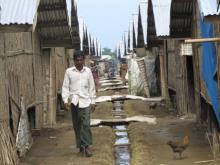
At the end of a three-day tour, the Saudi-based Organization of Islamic Cooperation told Buddhist-majority Myanmar to repeal “laws restricting fundamental freedoms” after more than 240 Muslims were killed by Buddhist mobs during the past year.
Before the OIC delegates left Myanmar on Saturday, they visited minority ethnic Rohingya Muslims who fled the violence and are now living in squalid camps along the border with Bangladesh in Myanmar’s Arakan state, also known as Rakhine.
Headed by Secretary General Ekmeleddin Ihsanoglu, the OIC delegation called on the government to continue legal reforms, The New Light of Myanmar newspaper reported.
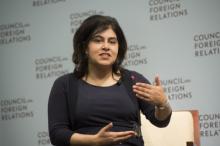
The highest-ranking Muslim in the British government on Friday called on Western governments to do more to protect besieged Christian minorities across the world, particularly in the Holy Land where they are now seen as “outsiders.”
Baroness Sayeeda Warsi, the government’s minister for faith and the first Muslim member of a British cabinet, said religious freedom is a proxy for human rights and must not be an “add-on” to foreign policy.
“A mass exodus is taking place, on a biblical scale,” she said in a speech at Georgetown University. “In some places, there is a real danger that Christianity will become extinct.”
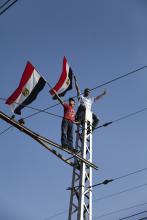
After decades of polarization along religious lines, Christians and Muslims in Egypt are coming together to rally behind their flag.
The country is in the midst of a swell of nationalism that began during the revolution in 2011 and intensified when citizens took to the streets in June of this year to call for the removal of President Mohammed Morsi of the Muslim Brotherhood.
Egyptian flags adorn houses and buildings throughout the capital, and everything — from sandbags buttressing military blockades to pillars along the Nile Corniche — has been painted in the national colors of black, white, and red.
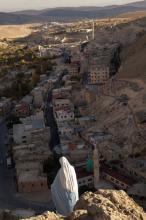
A huge statue of the Virgin Mary towers over churches, monasteries and mosques in the Syrian city of Maaloula, where a dialect of the Aramaic language of Jesus is still spoken.
The town has managed to stay out of the Syrian conflict between Sunni Muslim rebels and the regime of dictator Bashar Assad, as have most of Syria’s 2 million Christians.
But worsening violence has forced the community into a corner: Continuous clashes between the rebels and the regime in this isolated town of 2,000 people as well as other Christian towns over the past two weeks have many Christians worried that they will no longer be allowed to stay neutral.
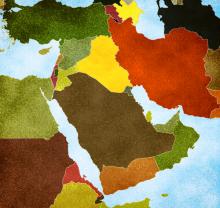
The backlash against Muslim Brotherhood rule in Egypt comes as secular forces across the Middle East are rising up in opposition to political Islam. Divisions reach from top leaders to the street.
Political leaders in Saudi Arabia, United Arab Emirates, Kuwait and Jordan have sided with the Egyptian military and secularists who backed the July 3 ouster of President Mohammed Morsi.
On the streets of Cairo over the weekend, mobs and snipers attacked Morsi supporters, forcing security forces accused of slaughtering the Islamists to stand between them and the mob. The violence in Egypt echoes similar, though less deadly, backlashes against Islamic ruling parties in Tunisia, and Turkey.
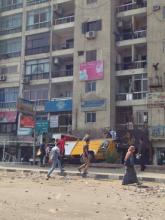
Egypt now teeters on the edge of an abyss. Sen. John McCain (R-Ariz.), who was in Cairo earlier this month at President Obama’s request to mediate between the military-backed interim government and supporters of ousted President Mohammed Morsi, told CBS News: “Oh my God, I didn’t know it was this bad. These folks are just days or weeks away from all-out bloodshed.”
The widely anticipated military crackdown against pro-Morsi demonstrators began last week, so we’d better brace for the blow-back.
The rising specter of repression in Egypt is difficult to watch for two reasons. First, it confirms that the counterrevolution is successfully restoring the deep state — the vast security apparatus upon which military autocracy in Egypt has been based since Gamal Abdel Nasser’s rule in the 1950s, effectively extinguishing any hope of transition to democracy. Second, the violent crackdown evokes bad memories of earlier efforts by Egypt’s military strongmen to crush their Islamist opposition.
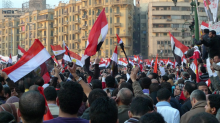
Nelson Mandela, the first democratically elected president of South Africa, has been in the hospital for more than two months. Nearly 20 years after his election South Africa remains, despite myriad troubles, a stable, multiracial, and democratic country.
Mohamed Morsi, the first democratically elected president of Egypt after the world-changing protests in Tahrir Square led to the resignation of former president Hosni Mubarak, has been out of office, by way of military coup, for more than one month. He is now being held by the military under house arrest at an undisclosed location, and the mere mention of his name divides the citizens of Egypt. This division has led to the death of more than five hundred Morsi supporters this week alone. In response, members of the Muslim Brotherhood and Morsi supporters have attacked dozens of Coptic Christian Churches.

Since the July 3 ousting of former president Mohammed Morsi, Christians in Egypt have faced a shocking spike in violent attacks. Human rights groups in the country claim that to date, Egyptian authorities have not prevented the persecution.
Christians make up nearly one-tenth of Egypt's population of 80 million. While Egypt's Coptic Christians have faced longstanding persecution, many are reporting that tensions between Sunni Muslims and minority Christians are the highest they have been for decades. USA Today reports:
Churches, houses, monasteries, orphanages, schools and businesses belonging to Copts were attacked in nine provinces "causing panic, losses and destruction for no reason and no crimes they committed except being Christians," the Maspero Youth Union, a Coptic activist group, said Thursday.
Youssef Sidhom, editor-in-chief of the Christian weekly Watani, said the recent attacks are painful and vicious but it be worse if they are allowed to divide the two faiths.
USA Today has created an interactive map with real-time updates on attacks on Christian institutions, stretching from Alexandria to Qena. View the map here.
Read more of USA Today's story here.
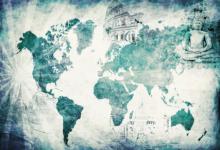
Tumult in Egypt reminds me how complicated the world can be, especially for a culture like our own that is shaped by good guy vs. bad guy dramas.
Who are the “good guys” in Cairo? Is the ousted president a good guy for being democratically elected or a bad guy for pursuing isolationist Islamic policies? Is the military saving Egypt or preserving privileges?
It isn’t just the inherent complexity of any human situation. It’s the complexity of societies that have rules and histories quite unlike our own.
THE 2011 REVOLUTION that led to the ouster of Egyptian President Hosni Mubarak signaled hope and liberation for the people of Egypt. But many Egyptians and others fear that President Mohamed Morsi, in his actions to consolidate power and quell opposition, has become “Mubarak with a beard.”
Sen. Ehab El Kharrat, a psychiatrist and Christian member of the Shura Council, Egypt’s upper house of Parliament, still looks to his country’s future with hope. Kharrat talked with Mary Theresa Webb early this year while the senator was in Washington, D.C., for the National Prayer Breakfast. Webb is the founder of the GOAL Project, a U.S.-based organization that provides addiction recovery training for churches and communities around the world, including Egypt.
—The Editors
Mary Theresa Webb: You are one of three Christians elected to the Egyptian Parliament. Could you describe why you decided to run for office? How does your Christian faith influence your work?
Ehab El Kharrat: I was elected by both Muslims and Christians to serve the whole people. I stand for love and freedom, and I think these are the things my savior and Lord Jesus stood for. My political involvement is not about the rights of the Christian minority in Egypt, but about the rights and dignity of all.
We on the Shura Council have received threats from violent groups, Muslim extremists, and the secularist terrorist group called the Black Bloc, who wear black masks and defend secular protesters with violence. I once stood up in a human rights session and said that I may be threatened and killed, but I will not accept the Black Bloc members’ violence and pledged all to refrain from such violence. If I die, I die. But I want to keep our revolution peaceful.
I like to think that the spirit of Christ is the spirit of justice, freedom, and love. One of my heroes, Charles Grandison Finney, the 19th-century New England theologian and revivalist, said [paraphrase], “Revolution is inevitable if the virtue or wisdom of the people exceeds that of its rulers, or if the vice and ignorance of the people exceeds that of its rulers.” I like to think that the first half of his statement applies to the Egyptian revolution.
The Islamic political party known as the Muslim Brotherhood has soured American attitudes towards Egypt, arguably America’s most important Arab ally, since its candidate Mohamed Morsi won presidential elections there in June 2012.
That’s according to a poll released Friday by the Arab American Institute in Washington, D.C.
Morsi’s term has been dogged by charges that he opts for authoritarian measures such as martial law. Muslim-Christian clashes have also shadowed his term; there were clashes on April 5 in the town of Khosus that killed four Coptic Christians and one Muslim, and violence also marred the April 7 funeral for the Copts who were killed in that conflict.
According to the Institute’s poll of 2,300 likely voters, only 36 percent of Americans had favorable views of Egypt, down from 66 percent in 1997. At least some of the decline has been attributed to the Muslim Brotherhood, which won Egypt’s parliamentary elections in January 2012, and to Morsi himself, who won the presidency last June by a 52-48 percent margin.

Editor's Note: The following is a transcript of President Barack Obama's remarks to the UN General Assembly in New York City on Tuesday, in which he condemns global violence and extremism, framing the speech around the recent tragedy at the U.S. consulate in Libya.
THE PRESIDENT: Mr. President, Mr. Secretary General, fellow delegates, ladies and gentleman: I would like to begin today by telling you about an American named Chris Stevens.
Chris was born in a town called Grass Valley, California, the son of a lawyer and a musician. As a young man, Chris joined the Peace Corps, and taught English in Morocco. And he came to love and respect the people of North Africa and the Middle East. He would carry that commitment throughout his life. As a diplomat, he worked from Egypt to Syria, from Saudi Arabia to Libya. He was known for walking the streets of the cities where he worked -- tasting the local food, meeting as many people as he could, speaking Arabic, listening with a broad smile.
Chris went to Benghazi in the early days of the Libyan revolution, arriving on a cargo ship. As America’s representative, he helped the Libyan people as they coped with violent conflict, cared for the wounded, and crafted a vision for the future in which the rights of all Libyans would be respected. And after the revolution, he supported the birth of a new democracy, as Libyans held elections, and built new institutions, and began to move forward after decades of dictatorship.
Chris Stevens loved his work. He took pride in the country he served, and he saw dignity in the people that he met. And two weeks ago, he traveled to Benghazi to review plans to establish a new cultural center and modernize a hospital. That’s when America’s compound came under attack. Along with three of his colleagues, Chris was killed in the city that he helped to save. He was 52 years old.
Muslim and Coptic Christian leaders in the U.S. are pledging not to let a spate of violent protests in some 20 Islamic countries derail recent efforts to improve the sometimes troubled relations between the two communities.
On Sept. 18, the Egyptian government ordered the arrest of seven Egyptian-born Copts now living in the United States who were allegedly involved in an anti-Muslim film that portrayed Islam's Prophet Muhammad as a bumbling sexual pervert.
“We cannot allow the actions of a few deceived fanatical individuals to define our communities,” said Bishop Serapion, head of the Los Angeles Diocese of the Coptic Orthodox Church, speaking during a press conference on Sep. 17 with Muslim leaders in Los Angeles.
“We call on members of both religions to lean on our faiths to counter the hate and the violence with good speech and positive work,” added the Egyptian-born bishop.
The show of solidarity comes almost a week after protesters in Egypt, where about 10 percent of the 90 million Egyptians are Coptic, attacked the U.S. embassy, setting off protests in other Muslim countries, including neighboring Libya, where American ambassador Christopher Stevens and three other Americans were killed.

When inflamed mobs stormed the U.S. embassies in Libya and Egypt on Tuesday, the media quickly looked to a likely spark.
Florida Pastor Terry Jones ignited deadly riots by threatening to burn Qurans in 2010, and by torching the Islamic holy text last year. Recently, Jones said he would promote a crude film that portrays Islam’s Prophet Muhammad as a foolish sexual pervert.
But in the days before the protests, Jones made no public mention of the film — called Innocence of Muslims — even as he prepared to stage an “International Judge Muhammad Day” on Sept. 11.
Instead, the man who translated the film into Arabic, sent it to Egyptian journalists, promoted it on his website and posted it on social media was an obscure Egyptian-born Coptic Christian who lives near Washington and proudly touts his ties to Jones.
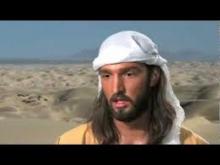
I finally sat down and watched the entire 11-plus minute video, Innocence of Muslims, which is at the heart of the recent outrage in Islamic countries in Yemen and north Africa. Suffice it to say, I lost a healthy share of brain cells in the process. The narrative – if you can call it that – is incoherent throughout, the sound is barely audible in places and the overall production values make the Annoying Orange series look like Scorsese.
That said, there’s plenty to anger Muslims in this clip, or anyone who values religious tolerance, plural coexistence, or even basic respect for human nature.

Muslim Americans condemned violence in Egypt and Libya that left four Americans dead, but remain concerned that the deaths could rekindle anti-Muslim sentiment just as post-9/11 resentment was starting to ebb.
U.S. Ambassador to Libya Christopher Stevens and three embassy workers were killed on Tuesday when fundamentalist protestors attacked the U.S. consulate in Benghazi, Libya, in response to a low-budget film that attacks Islam’s Prophet Muhammad, reportedly made by an Israeli real estate developer who lives in California.
Imam Talal Eid, the Islamic chaplain at Brandeis University near Boston and a former member of the U.S. Commission on International Religious Freedom, predicted the violence would lead to “more resentment” against Muslims, who he criticized for not doing enough against terrorism.